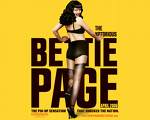The Notorious Bettie Page

dir. Mary Harron
"You can't advertise that, Larry."
"Why not?"
"You just can't."
- The People vs. Larry Flynt
We're a society learning to embrace its vices. I don't say this in a judgmental or preaching way, just a matter of fact. I've always believed that just as in politics, where it's never the crime but the cover up that undoes you, that vices are mostly harmless in themselves. It's our rationalization, shame and denial around our vices that inspires bad behavior.
And that's why there will never be a movie called The Notorious Jenna Jameson. Pornography was a clandestine, underground secret thing until the wizards of the coast invented a pornography delivery machine that could be installed in every house and (get this), has a myriad of OTHER uses so profound that no one can stand to be without one!
The pornstars of today are much more accomplished than their ancestors, yet none will likely inspire the same sense of mysterious notoriety as Bettie Page, not in a world where hardcore S/M porn like "The Fashionistas" can become a mainstream Vegas hit.
Bettie Page is the third film along with I Shot Andy Warhol and American Psycho in Mary Harron's "notoriety" series. The first two films were told from the point of view of obsessive, anti-social narrators, one an extreme misanthrope and the other an extreme misogynist.
Valerie Solanas and Patrick Bateman make the perfect couple: Patrick embodies the vapid, shallow, libido-driven masculinity Valerie condemns in her "SCUM Manifesto" and Valerie is the perfect self-involved, socially tone-deaf victim of Patrick's constrained rage.
In moving on to Bettie Page, the S/M pinup queen of the 50s, it would be tempting to give her the same treatment: an intense narration.
But, instead, we get very little insight into Bettie herself. She poses for photos, downplays the sleaze, tolerates some leers and some awkward moments, comes out without regrets and moves on with her life.
Because, unlike Bateman or Solanas, Bettie Page is not obsessed with society, society is obsessed with HER. Bettie Page was our collective schoolyard crush, the first pube of America's sexual awakening, a shadowy wet dream whose legacy was the hot, hot morning sex of the 60s and 70s, the patron saint of the Boogie Knights.
And, like all icons, what matters is not what she truly WAS, but what we see when we look at her.
Three stars, Jason says we're going to be taking some pictures today, if that's okay, don't feel any pressure, but if you want to join in we can pay you $100. And then maybe someday, who knows, you might end up on a stamp or something.


